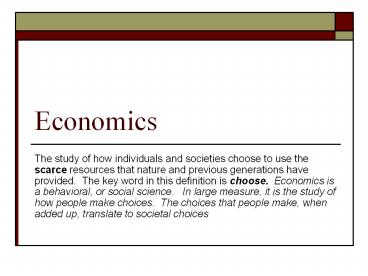Economics PowerPoint PPT Presentation
Title: Economics
1
Economics
- The study of how individuals and societies choose
to use the scarce resources that nature and
previous generations have provided. The key word
in this definition is choose. Economics is a
behavioral, or social science. In large
measure, it is the study of how people make
choices. The choices that people make, when
added up, translate to societal choices
2
WHY STUDY ECONOMICS?
- A WAY OF THINKING
- UNDERSTAND SOCIETY
- UNDERSTAND GLOBAL AFFAIRS
- TO BE AN INFORMED CITIZEN
3
1. ECONOMIC WAY OF THINKING
- OPPORTUNITY COST
- MARGINALISM
- EFFICIENT MARKETS NO FREE LUNCH
WHY STUDY ECONMICS
4
1. A WAY OF THINKINGOPPORTUNITY COST
- The best alternative that we forgo, or give up,
when we make a choice or decision.
SCARCE - LIMITED
WHY STUDY ECONMICS
5
1. A WAY OF THINKINGMARGINALISM
- The process of analyzing the additional or
incremental costs or benefits arising from a
choice or decision.
Sunk Cost Cost that cannot be avoided because
they have already been incurred
WHY STUDY ECONMICS
6
A WAY OF THINKINGEFFICIENT MARKETS
- A market in which profit opportunities are
eliminated almost instantaneously. - TINSTAAFL
- There Is No Such Thing As A Free Lunch
WHY STUDY ECONMICS
7
2. To Understand Society
- From the Industrial Revolution to the e
Revolution
WHY STUDY ECONMICS
8
3. TO UNDERSTAND GLOBAL AFFAIRS
- Currency
- Trade (Free Trade)
- Wars
- Immigration
- Economic Interdependence
WHY STUDY ECONMICS
9
4. TO BE AN INFORMED CITIZEN
- Boom and Bust Cycles
- Understanding recession and the causes
- Voters (when we participate in the political
process, we are voting on issues that require a
basic understanding of economics)
WHY STUDY ECONMICS
10
The Method of Economics
- positive economics An approach to economics that
seeks to understand behavior and the operation of
systems without making judgments. It describes
what exists and how it works.
normative economics An approach to economics
that analyzes outcomes of economic behavior,
evaluates them as good or bad, and may prescribe
courses of action. Also called policy economics.
10 of 34
11
The Method of Economics
Theories and Models
All Else Equal Ceteris Paribus
ceteris paribus, or all else equal A device used
to analyze the relationship between two variables
while the values of other variables are held
unchanged.
Using the device of ceteris paribus is one part
of the process of abstraction. In formulating
economic theory, the concept helps us simplify
reality to focus on the relationships that
interest us.
Ockhams razor The principle that irrelevant
detail should be cut away.
11 of 34
12
The Method of Economics
Economic Policy
Criteria for judging economic outcomes 1.
Efficiency 2. Equity 3. Growth 4. Stability
12 of 34
13
The Method of Economics
Economic Policy
Efficiency
efficiency In economics, allocative efficiency.
An efficient economy is one that produces what
people want at the least possible cost.
Equity
equity Fairness.
13 of 34
14
The Method of Economics
Economic Policy
Growth
economic growth An increase in the total output
of an economy.
Stability
stability A condition in which national output
is growing steadily, with low inflation and full
employment of resources.
14 of 34

